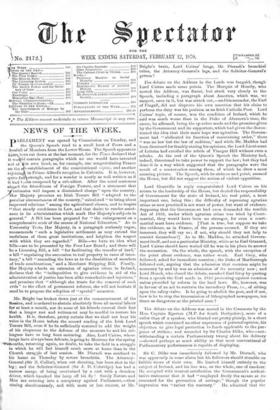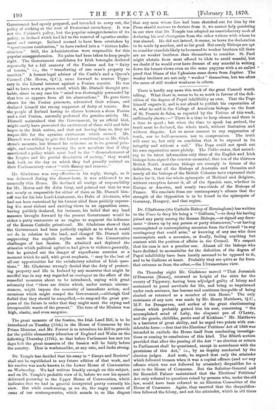Sir C. Dilke was immediately followed by Mr. Disraeli, who
was apparently in some alarm lest his followers should stumble on fallible views of their own. He limited himself entirely to the subject of Ireland, and his line was, on the whole, one of candour. He accepted with ironical satisfaction the Government's authori- tative statement that it had " employed freely the means at its command for the prevention of outrage," though the popular impression was " rather the contrary." He admitted that the
Government had openly prepared, and intended to carry out, the policy of striking at the root of Protestant ascendancy. It was not the Cabinet's policy, but the popular misapprebension•of its policy, in Ireland which had led to the renewal of agrarian excite- ment and outrage. Ireland seemed to have been overtaken by "spontaneous combustion," to have rushed into a " riotous hallu- civation." Still, the Administration were responsible for this popular misapprehension. No pains had been taken to keep people right. The Government candidates for Irish boroughs declared repeatedly for a full amnesty of the Fenians and for " fixity of tenure," i.e., the " transferring of one man's property to another." A former legal adviser of the Castle's and a Queen's Counsel (Mr. Heron, Q.C.), came forward to contest Tippe- rary in the Liberal interest against a Fenian convict. He was said to have worn a green scarf, which Mr. Disraeli thought pro- bable, since in any case his " mind was thoroughly permeated by that hue as appears from all his observations." He gave three cheers for the Fenian prisoners, advocated their release, and declared himself the strong supporter of fixity of tenure. But the people of Ireland having to choose between a sham Fenian and a real Fenian, naturally preferred the genuine article. Mr. Disraeli maintained that the Government, by an official hint, might easily have prevented the excitement of these wild and false hopes in the Irish nation, and that not having done so, they are responsible for the agrarian excitement which ensued. Mr. Disraeli was willing to give the fairest consideration to Mr. Glad- stone's measure, but blamed his reticence as to its general prin- ciple, and concluded by warning the new members that if they sanctioned a policy which must lead to the " dismemberment of the Empire and the partial dissolution of society," they would look back on the day on which they had proudly entered on their Parliamentary career " with dismay and remorse."



































